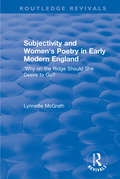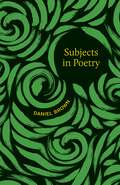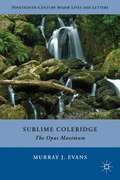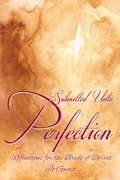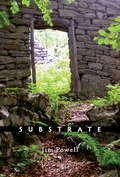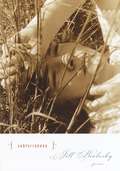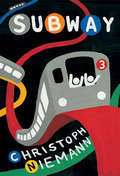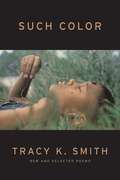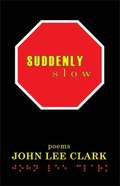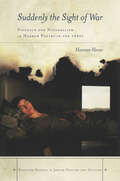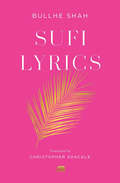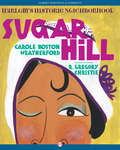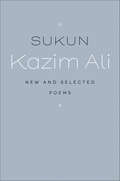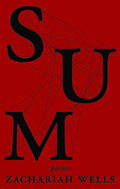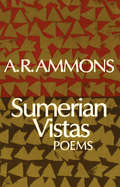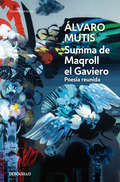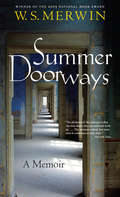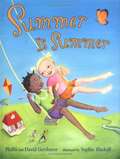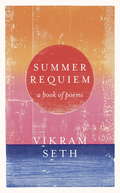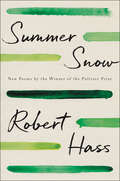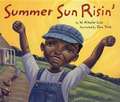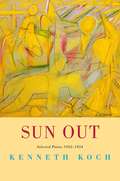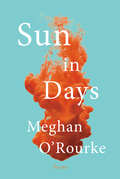- Table View
- List View
Subjectivity and Women's Poetry in Early Modern England: Why on the Ridge Should She Desire to Go? (Routledge Revivals)
by Lynnette McGrathThis title was first published in 2002: Combining the approaches of historic scholarship and post-structural, feminist psychoanalytic theory to late 16th- and early 17th-century poetry by women, this book aims to make a unique contribution to the field of the study of early modern women's writings. One of the first to concentrate exclusively on early modern women's poetry, the full-length critical study to applies post-Lacanian French psychoanalytic theory to the genre. The strength of this study is that it merges analysis of socio-political constructions affecting early modern women poets writing in England with the psychoanalytic insights, specific to women as subjects, of post-Lacanian theorists Luce Irigaray, Helen Cixous, Julia Kristeva, and Rosi Braidotti.
Subjects in Poetry
by Daniel BrownDaniel Brown’s Subjects in Poetry is the first book to examine the broad and imposing topic of poetic subject matter, probing both what poems are about and how that influences the way they're made. It comprises one poet’s attempt to plumb the nature of his art, to ask how the selection of material remains a crucial yet unexplored area of poetic craft, and to suggest the vast range of possible subjects for poems.The book begins by venturing a novel definition of “subject,” derived from Robert Frost’s dictum that poetry constitutes an “art of having something to say.” Brown posits that a poem can say something by expressing, evoking, or addressing. He considers each of these ways-of-saying in turn, first defining it and then looking at poems in which it predominates. Brown next makes a wide-ranging case for the value of subjects to poems, poets, and the art of poetry, especially at a time when many poems appear subjectless. He concludes the book with practical guidance on finding subjects, improving them, and realizing their potential.Replete with thoughtful readings of poems both classic and contemporary, Subjects in Poetry should appeal to poets across all levels and readers interested in understanding the art and practice of poetry.
Sublime Coleridge
by Murray J. EvansSamuel Taylor Coleridge's Opus Maximum, written in the early 1820s and first published in 2002, is a challenge to every scholar who has encountered it. Sublime Coleridge offers an excellent entry point to this important text of British Romanticism, with an introduction, a reader's guide, and background information. Murray Evans introduces each major theme of the Opus Maximum the Will, divine ideas, human subjectivity, and the Trinity and shows their importance in explaining Coleridge's ideas about religion, psychology, and the sublime. "
Submitted Unto Perfection: Reflections for the Bride of Christ
by Jo GwostSubmitted Unto Perfection is a collection of writings penned over a number of years. The title was given to me by the Lord over thirty years ago. Before writing it I had to live it. This short book reflects some of my life lived submitted unto Him. I hope it stirs the hearts of those who love God, to draw to Him, in fuller trust and devotion.
Substrate: Poems
by Jim PowellWhen Jim Powell's first collection of poems was published in 1989, Thom Gunn declared, "He has the power to do anything. " Mary Kinzie wrote, "Page for page, there is more metaphorically gorgeous writing than I have seen in some time. " Here is his much-anticipated new collection. Jim Powell's poems move between the metaphysical and the physical with a rare, plainspoken intensity and eloquence. At the heart of Substrate is a grand sequence of poems that encompasses the cultural history of northern California in a kaleidoscope of artifact, memento, observation, and consideration. At once accessible and haunting, these poems resonate with the layers of experience, expectation, and substance that make up the patchwork of surfaces that define our known world.
Subterranean
by Jill BialoskyJill Bialosky follows her acclaimed debut collection,The End of Desire, with this powerful sequence of poems that probes the subterranean depths of eros. Gerald Stern has called Bialosky “the poet of the secret garden, the place, at once, of grace and sadness,” and here she enters that garden again, blending the classical with the contemporary in bold considerations of desire, fertility, virginity, and childbirth. Written against the idealizations of romantic love and motherhood, she tells of the loss of one child and the birth of another, the fierce passions of life before children, the seductions of suicide, and the comforts of art. Throughout, she braids and unbraids the distinct yet often inseparable themes of motherhood, love, and sexuality. “When he comes to me,” she writes, half-filled glass in his hand, wanting me to touch him, I hear you stir in your crib. I know what your body feels like. The soft skin of a flower, not bruised, not yet in torment . . . Subterraneanis the moving and intimate account of the emergence of a female psyche. Like the figures of Persephone and Demeter, who appear in various forms in these poems, Bialosky finds a strange beauty in grief, and emerges from the realms of temptation with insight and distinction. From the Hardcover edition.
Subway
by Christoph NiemannSpeed. Color. Sound. Numbers. Maps. Connections. Navigation. Subway systems may be specific to certain cities around the world, but the pure thrill of a subway ride is universal to all young children.Christoph Niemann’s graphically elegant and playful picture book is a tour de force for preschoolers and a stellar addition to the canon of books about trains, trucks, planes, and automobiles.Based on the author’s own underground adventures with his young boys—chronicled for adult readers in Niemann’s New York Times blog, Abstract City—this innovative picture book is an invitation down underground, where a system of trains and tracks delivers millions of riders to their destinations each day.“Underneath the city is this beautifully simple system of letters, numbers, and colors. The trains and stations are huge and impressive but also comforting, because nothing ever changes. My boys are in charge; they can read the signs, navigate the grid, and they always know what happens next.”—Christoph Niemann
Such Color: New and Selected Poems
by Tracy K. Smith“Tracy K. Smith’s poetry is an awakening itself.” —VogueCelebrated for its extraordinary intelligence and exhilarating range, the poetry of Tracy K. Smith opens up vast questions. Such Color: New and Selected Poems, her first career-spanning volume, traces an increasingly audacious commitment to exploring the unknowable, the immense mysteries of existence. Each of Smith’s four collections moves farther outward: when one seems to reach the limits of desire and the body, the next investigates the very sweep of history; when one encounters death and the outer reaches of space, the next bears witness to violence against language and people from across time and delves into the rescuing possibilities of the everlasting. Smith’s signature voice, whether in elegy or praise or outrage, insists upon vibrancy and hope, even—and especially—in moments of inconceivable travesty and grief.Such Color collects the best poems from Smith’s award-winning books and culminates in thirty pages of brilliant, excoriating new poems. These new works confront America’s historical and contemporary racism and injustices, while they also rise toward the registers of the ecstatic, the rapturous, and the sacred—urging us toward love as a resistance to everything that impedes it. This magnificent retrospective affirms Smith’s place as one of the twenty-first century’s most treasured poets.
Suddenly Slow: Poems
by John Lee ClarkThis collection of poems opens with a stumble: 'It was not there / until I tripped over it.' But this is fitting because John Lee Clark bounces back, as he always does, artfully and unexpectedly, to make an astonishing statement. Snowballs, his long white cane, pears, Braille, bedsheets, sign language, and even morning light come alive in this deaf-blind poet's hands like they have never before. Thanks to his sparkling language, his intellectual playfulness, and his capacity for wonder, together with his unique perceptions of life, his poems add a much-needed new wrinkle to the lexicon of imagination. What he reflects on, others cannot see in the same way again, and that includes the poet himself: We understand that he is like the rest of humankind in all the most important ways.
Suddenly, the Sight of War: Violence and Nationalism in Hebrew Poetry in the 1940s
by Hannan Hever translated by Lisa KatzSuddenly, the Sight of War is a genealogy of Hebrew poetry written in Israel between the beginning of World War II and the War of Independence in 1948. In it, renowned literary scholar Hannan Hever sheds light on how the views and poetic practices of poets changed as they became aware of the extreme violence in Europe toward the Jews. In dealing with the difficult topics of the Shoah, Natan Alterman's 1944 publication of The Poems of the Ten Plagues proved pivotal. His work inspired the next generation of poets like Haim Guri, as well as detractors like Amir Gilboa. Suddenly, the Sight of War also explores the relations between the poetry of the struggle for national independence and the genre of war-reportage, uniquely prevalent at the time. Hever concludes his genealogy with a focus on the feminine reaction to the War of Independence showing how women writers such as Lea Goldberg and Yocheved Bat-Miryam subverted war poetry at the end of the 1940s. Through the work of these remarkable poets, we learn how a culture transcended seemingly unspeakable violence.
Sufi Lyrics: Selections from a World Classic (Murty Classical Library Of India - Hup Ser. #1)
by Bullhe ShahBullhe Shah’s work is among the glories of Panjabi literature, and the iconic eighteenth-century poet is widely regarded as a master of mystical Sufi poetry. His verses, famous for their vivid style and outspoken denunciation of artificial religious divisions, have long been beloved and continue to win audiences around the world. This striking new translation is the most authoritative and engaging introduction to an enduring South Asian classic.
Sugar Hill
by Carole Boston Weatherford R. Gregory ChristieTake a walk through Harlem's Sugar Hill and meet all the amazing people who made this neighborhood legendary. With upbeat rhyming and read-aloud text, Sugar Hill celebrates the Harlem neighborhood that successful African Americans first called home during the 1920s. Children raised in Sugar Hill not only looked up to these achievers but also experienced art and culture at home, at church, and in the community. Books, music lessons, and art classes expanded their horizons beyond the narrow limits of segregation. Includes brief biographies of jazz greats Duke Ellington, Count Basie, Sonny Rollins, and Miles Davis; artists Aaron Douglas and Faith Ringgold; entertainers Lena Horne and the Nicholas Brothers; writer Zora Neale Hurston; civil rights leader W. E. B. DuBois; and lawyer Thurgood Marshall. <P><P><i>Advisory: Bookshare has learned that this book offers only partial accessibility. We have kept it in the collection because it is useful for some of our members. To explore further access options with us, please contact us through the Book Quality link. Benetech is actively working on projects to improve accessibility issues such as these.</i>
Sukun: New and Selected Poems (Wesleyan Poetry Series)
by Kazim AliKazim Ali is a poet, novelist, and essayist whose work explores themes of identity, migration, and the intersections of cultural and spiritual traditions. His poetry is known for its lyrical and expressive language, as well as its exploration of themes such as love, loss, and the search for meaning in a rapidly changing world. "Sukun" means serenity or calm, and a sukun is also a form of punctuation in Arabic orthography that denotes a pause over a consonant. This Sukun draws a generous selection from Kazim's six previous full-length collections, and includes 35 new poems. It allows us to trace Ali's passions and concerns, and take the measure of his art: the close attention to the spiritual and the visceral, and the deep language play that is both musical and plain spoken.[sample poem]The Fifth PlanetCome, early summer in the mountains, and come, strawberry moon,and carry me softly in the silver canoe on wires to the summit, where in that way of late night useless talk, the bright dark asks me, "What is the thing you are most afraid of?" and I already know which lie I will tell.There were six of us huddled there in the cold, leaning on the rockslingering in the dark where I do not like to linger, looking up at thesharp round pinnacle of light discussing what shapes we saw—rabbit,man, goddess—but that brightness for me was haunted by no thing,no shadow at all in the lumens.What am I, what am I, I kept throwing out to the hustling silence.No light comes from the moon, he's just got good positioning and I suppose that's the answer, that's what I'm most afraid of,that I'm a mirror, that I have no light of my own, that I hang in empty spacein faithful orbit around a god or fatherneither of Whom will ever see me whole. I keep squinting to try to see Jupiterwhich the newspaper said would be found near the moon but it's nowhere, they must have lied. Or like god, there is too muchreflection, headsplitting and profane, scraping up every shadow,too much light for anyone to see.
Sum
by Zachariah WellsNimbly slipping between personae, masks, and moods, the prosody-driven poems of Sum weigh the volatility and mutability of the self against the forces of habit, instinct, and urge. <P><P>With homages to Hopkins, Graves, Wislawa Szymborska, Paul Muldoon, and more, and in allusion-dappled, playfully sprung stanzas, this third book from poet and critic Zachariah Wells both wears its influences openly and spins a sound texture all its own, in a collection far greater than its parts.Zachariah Wells is the author of two collections of poetry and a book of criticism (Career Limiting Moves, 2014).
Sumerian Vistas: Poems
by A. R. AmmonsAmmons's poetic genius has always been at home in forms ranging from brief lyrics to longer works. In the present volume—the first since his highly acclaimed Lake Effect Country—readers will find superb examples of work in both forms. "The Ridge Farm," which begins the book, and "Tombstones," at its center, are fine longer meditations, while "Motion's Holdings," the concluding section, contains a number of his best new shorter poems. The book is proof, once again, that Ammons is one of our major American poets.
Summa de Maqroll el Gaviero
by Álvaro MutisEn Maqroll el Gaviero, «esta especie de otro yo que escribe mis cosas», habita la obra poética de Álvaro Mutis. <P><P>Por los poemas que presentamos yerra su carácter fabuloso, el torrente de lo vivo y lo imaginario, la voz que canta al viaje, que recrea las batallas y las vidas de otros hombres, que recoge los vestigios del amor, que zarpa a la muerte, una voz casi ancestral que celebra la maravilla perdida. <P><P>Liberados de ataduras formales y de género, los versos de Álvaro Mutis dan fe del inesperado prodigio que obran las palabras, como apunta el poema que cierra el volumen, en manos de «infatuados tribunos ávidos de un poder hecho de sombra y desventura.»
Summer Doorways: A Memoir
by W. S. MerwinAmerica today is a mobile society. Many of us travel abroad, and few of us live in the towns or cities where we were born. It wasn't always so. “Travel from America to Europe became a commonplace, an ordinary commodity, some time ago, but when I first went such departure was still surrounded with an atmosphere of adventure and improvisation, and my youth and inexperience and my all but complete lack of money heightened that vertiginous sensation,” writes W. S. Merwin. Twenty-one, married and graduated from Princeton, the poet embarked on his first visit to Europe in 1948 when life and traditions on the continent were still adjusting to the postwar landscape.
Summer Grass
by Marianne BlugerWinner of the 1993 Archibald Lampman Award and shortlisted for the 1992 Pat Lowther Award Summer Grass follows Marianne Bluger's previous Brick books, On Nights Like This (1984) and Gathering Wild (1988). The two movements of Summer Grass, between them, comprehend the darknesses of "County Dire" and the depths of contentment in love and in home among the other (animate and inanimate) members of earth. Not literature, these poems are "uttered deeds." They probe "midnight gravities" with a light-suffused language born of faith.
Summer Is Summer
by Phillis Gershator David GershatorA rose is a rose And everything grows-- When summer is summer is summer. What is summer? For many children summer is lemonade and salty air, baseball and ice cream, fireflies and starry nights, and much, much more. Join four friends as they explore the outdoor world of summer and all its sensory pleasures.
Summer Requiem: From the author of the classic bestseller A SUITABLE BOY
by Vikram Seth'I have so carefully mapped the corners of my mindThat I am forever waking in a lost country...'SUMMER REQUIEM traces the immutable shifting of the seasons, the relentless rhythms of a great world that both 'gifts and harms'. Luminous, resonant and profound, these poems trace the dying days of summer, 'the hour of rust', when memory is haunted by loss and decay. But in the silence that follows, as the soul is cast adrift, there is also reconciliation with the transience of all things; the knowledge that there is a place, 'changeable, that will not betray'.
Summer Snow: New Poems
by Robert HassA major collection of entirely new poems from the Pulitzer Prize and National Book Award-winning author of Time and Materials and The Apple Trees at OlemaA new volume of poetry from Robert Hass is always an event. In Summer Snow, his first collection of poems since 2010, Hass further affirms his position as one of our most highly regarded living poets. Hass’s trademark careful attention to the natural world, his subtle humor, and the delicate but wide-ranging eye he casts on the human experience are fully on display in his masterful collection. Touching on subjects including the poignancy of loss, the serene and resonant beauty of nature, and the mutability of desire, Hass exhibits his virtuosic abilities, expansive intellect, and tremendous readability in one of his most ambitious and formally brilliant collections to date.
Summer Stinks
by Marty KellyFrom the book: Summer stinks. What more do you need to say About a hot, sweaty, bug riddled season? Well, what about heat stroke, or mosquitoes, or quicksand? Actually, you'll find 26 reasons summer stinks in this book--one for every letter of the alphabet. From "A is for ants" to "Z is for zapper", you'll never look at summer the same way again. An alphabetical lexicon for the estivally Dispirited. Other alphabet books are available from Bookshare. This file should make an excellent embossed braille copy.
Summer Sun Risin'
by W. Nikola-Lisa Don TateFrom sunrise to sunset, an African American boy spends an activity-filled summer day helping his family on their farm. Feeding animals, mowing hay, picking vegetables, and eating freshly caught fish fill the hours. Set in Texas in the 1950s, Summer Sun Risin' is Parenting Reading Magic Award winner W. Nikola-Lisa's tribute to childhood, farm life, and family togetherness. Don Tate's sun-drenched paintings depict the family's daily activities and trace the sun as it travels across the sky.
Sun Out: Selected Poems 1952-1954
by Kenneth KochMr. Koch's poems have a natural voice, they are quick, alert, instinctive . . . He has vivacity and go, originality of perception and intoxication with life. Most important of all, he is not dull." --Frank O'Hara, Poetry, 1955Gathered together for the first time, the exciting, startling early work of one of our finest poets. Writing as a young man in the 1950s, Koch, a member of the now famed New York School along with John Ashbery, Larry Rivers, Frank O'Hara, and others, experimented with the delicate balance between sound and sense to offer a series of poems resembling music or abstract painting. For example, he opens the title poem with: "Bananas, piers, limericks / I am postures / Over there, I, are / The lakes of delectation / Sea, sea you!"Also included are a selection of short plays in verse and Koch's innovative masterpiece, "When the Sun Tries to Go On," a poem that "produces a radical reworking of the life-poem myth predominant in American poetics since 'Song of Myself'" (William Watkins, In the Process of Poetry). About "When the Sun Tries to Go On," David Lehman wrote, "Koch takes a great deal of delight in the sounds of words and his consciousness of them; he splashes them like paint on a page with enthusiastic puns, internal rhymes, titles of books, names of friends, and seems surprised as we are at the often witty outcome" (Poetry, 1968).When the poems in Sun Out were originally published, they set a standard for the freshness and surprise of language used in extraordinary ways. For almost five decades they have delighted readers lucky enough to find them. It is our pleasure to make them once again available in this new and provocative collection.From the Hardcover edition.
Sun in Days: Poems
by Meghan O'RourkeA groundbreaking new collection by a celebrated writer of “ambitious and dynamic poems” (New York Times). From the acclaimed poet and critic Meghan O’Rourke comes a powerful collection about the frailty of the body, the longing for a child, and the philosophical questions raised when the body goes dramatically awry. In formally ambitious poems and lyric essays, Sun in Days gives voice to the experience of illness, the permanence of loss, and invigorating moments of grace. Wresting a recuperative beauty from one’s days, O’Rourke traces an arc from loss and illness to the life force of pregnancy and motherhood. Along the way, she investigates a newfound existential awareness of all that vanishes. This is O’Rourke’s most ambitious book to date: unsentimental yet deeply felt, and characterized by the lyric precision and force of observation for which her work is known. From “Idiopathic Illness” What can be said? I came w/o a warranty, Stripped of me—or me-ish-ness— I was a will in a subpar body. I waxed toward all that waned inside.
